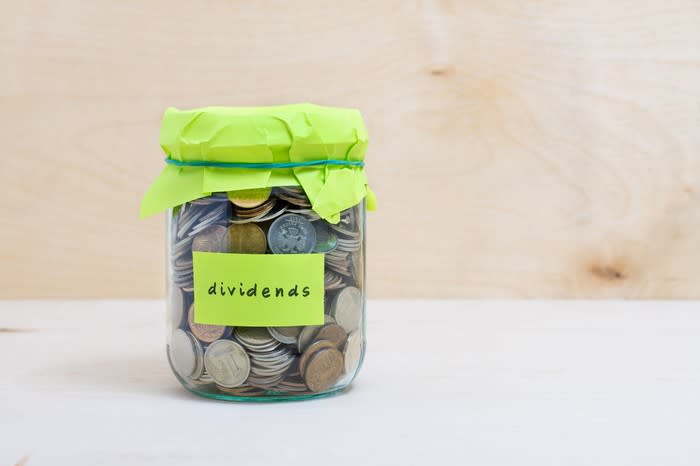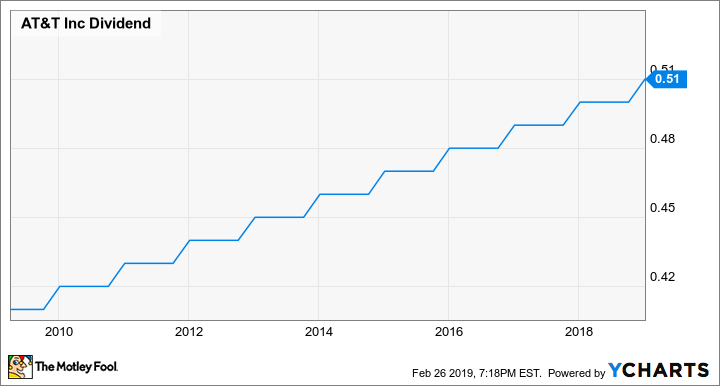AT&T Stock Should Keep Paying Fat Dividends
One stock that might attract many dividend growth investors is telecom giant AT&T (NYSE: T). Although the company's share price has been stagnant over the last five years against a broader market rally, the company has unfailingly paid a substantial and growing dividend, even as it has made significant acquisitions.
T Dividend data by YCharts.
As of writing, AT&T pays an annualized dividend of $2.04 per share, which translates into an eye-catching yield of 6.55%. To put that dividend yield into perspective, if the company didn't raise its dividend, and the stock price remained stagnant, an investor in AT&T could hope to double her money on shares purchased today in 11 years. If that dividend continues to increase, though, that doubling could happen even sooner.

Image source: Getty Images.
The questions investors might ask themselves are: Is AT&T's dividend sustainable, and will it continue to grow? I'd say the answer to both of those questions is yes. Here's why.
A sustainable dividend
Over the last 12 months, AT&T generated about $3.36 per share in free cash flow. Dividends are generally paid from free cash flow, so right off the bat, it's clear that the company raked in far more cash over the last 12 months than it paid out in terms of dividends. So, at a glance, not only can AT&T comfortably cover the dividend, but it should be able to keep paying it even if the company's free cash flow hits a speed bump.
With that said, we're not quite done with our analysis. As is often the case with telecom companies, AT&T carries a hefty debt load. As of its most recent earnings report, AT&T had about $171 billion in debt.
Debt isn't free -- companies need to pay interest to service that debt. AT&T isn't just looking to keep its debt where it is, either. In its most recent investor presentation, the company highlighted its strategy to bring that debt down over the course of 2019.
That debt reduction plan will consist of using the roughly $12 billion that it expects to have left over after paying out its dividend to bring down its debt level to approximately $158 billion. After that, the company says it hopes to bring in another $6 billion to $8 billion in cash through real-estate sales, non-core asset sales, and working-capital initiatives.
So, while AT&T has a lot of debt, it also generates a lot of free cash flow and is taking steps to bring its debt down to saner levels.
How about dividend growth?
Analysts currently expect AT&T to grow sales by 7.8% in 2019 followed by just 0.5% growth in the subsequent year. So, AT&T isn't a high-growth company, and it doesn't look like the company's free cash flow is set to see huge growth in the near term. The company also seems committed to further bringing down its debt load.
I do expect AT&T's leaders will want to continue growing the company's dividend in the coming years to ensure that its streak of 35 consecutive dividend increases (something management specifically highlighted on the last earnings call) remains unbroken. However, in the near term, I'd expect those increases to be fairly minimal until the balance sheet is less leveraged and/or the company sees substantial growth in free cash flow from current levels.
Investor takeaway
AT&T throws off so much cash and has such a strong position in its core markets that I don't think investors should worry about the company's dividend being cut -- this is the real deal. Moreover, I think that the company will continue to deliver annual dividend increases, even if the magnitude of those increases over the next couple of years isn't anything to write home about.
Over the long term, I'd say the biggest risk to investors interested in AT&T's dividend is that the total return AT&T will deliver -- that's the dividend as well as share price appreciation -- could underwhelm, as it has over the past five years.
More From The Motley Fool
Ashraf Eassa has no position in any of the stocks mentioned. The Motley Fool has no position in any of the stocks mentioned. The Motley Fool has a disclosure policy.

